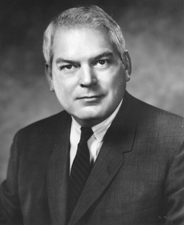
Marlow Webster Cook was an American politician who served Kentucky in the United States Senate from his appointment in December 1968 to his resignation in December 1974. He was a moderate Republican.

Jerry Edwin Abramson is an American Democratic politician who was the 55th lieutenant governor of Kentucky. On November 6, 2014, Governor Steve Beshear announced that Abramson would step down from his position as lieutenant governor to accept the job of Director of Intergovernmental Affairs in the Obama White House. He was replaced by former State Auditor Crit Luallen.
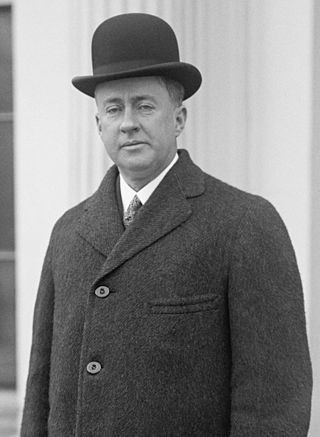
John Crepps Wickliffe Beckham was an American attorney serving as the 35th Governor of Kentucky and a United States Senator from Kentucky. He was the state's first popularly-elected senator after the passage of the Seventeenth Amendment.

The geology of the Ohio River, with but a single series of rapids halfway in its length from the confluence of the Monongahela and Allegheny rivers to its union with the Mississippi, made it inevitable that a town would grow on the site. Louisville, Kentucky was chartered in the late 18th century. From its early days on the frontier, it quickly grew to be a major trading and distribution center in the mid 19th century, important industrial city in the early 20th, declined in the mid 20th century, before revitalizing in the late 20th century as a culturally-focused mid-sized American city.

Frank Welsh Burke was an American politician who served as a Democratic member of the United States House of Representatives from Kentucky from 1959 to 1963 and as Mayor of Louisville, Kentucky from 1969 to 1973.
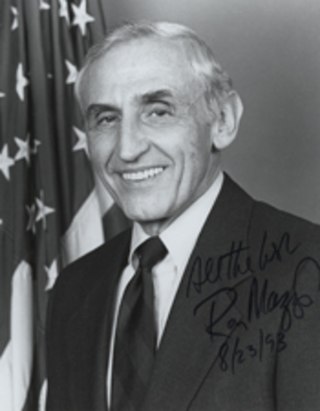
Romano Louis "Ron" Mazzoli was an American politician and lawyer from Kentucky.
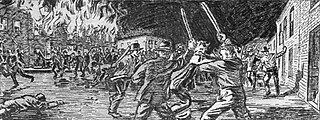
Bloody Monday was a series of riots on August 6, 1855, in Louisville, Kentucky, an election day, when Protestant mobs attacked Irish and German Catholic neighborhoods. These riots grew out of the bitter rivalry between the Democrats and the Nativist Know-Nothing Party. Multiple street fights raged, leaving twenty-two people dead, scores injured, and much property destroyed by fire. Five people were later indicted, but none were convicted, and the victims were not compensated.
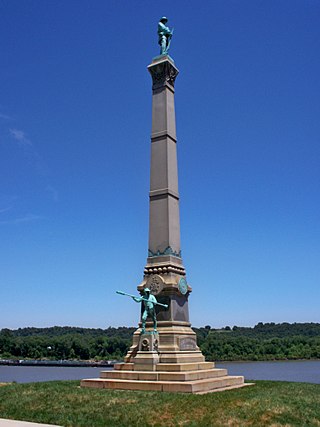
The Confederate Monument in Louisville is a 70-foot-tall monument formerly adjacent to and surrounded by the University of Louisville Belknap Campus in Louisville, Kentucky, United States. Relocation of the monument to Brandenburg, Kentucky, along the town's riverfront began November 2016, and was completed in mid-December. The granite and bronze structure was erected in 1895 by the Muldoon Monument Company with funds raised by the Kentucky Woman's Confederate Monument Association. The monument commemorates the sacrifice of Confederate veterans who died in the American Civil War.

Augustus Everett Willson was an American politician and the 36th Governor of Kentucky. Orphaned at the age of twelve, Willson went to live with relatives in New England. This move exposed him to such authors as Ralph Waldo Emerson, Henry Wadsworth Longfellow, Oliver Wendell Holmes, and James Russell Lowell, who were associates of his older brother, poet Forceythe Willson. He was also afforded the opportunity to attend Harvard University, where he earned an A.B. in 1869 and an A.M. in 1872. After graduation, he secured a position at the law firm of future Supreme Court justice John Marshall Harlan. Willson and Harlan became lifelong friends, and Willson's association with Harlan deepened his support of the Republican Party.

Louisville in the American Civil War was a major stronghold of Union forces, which kept Kentucky firmly in the Union. It was the center of planning, supplies, recruiting and transportation for numerous campaigns, especially in the Western Theater. By the end of the war, Louisville had not been attacked once, although skirmishes and battles, including the battles of Perryville and Corydon, took place nearby.

Wilson Watkins Wyatt was an American politician who served as Mayor of Louisville, Kentucky from 1941 to 1945 and as the 43rd Lieutenant Governor of Kentucky from 1959 to 1963. He was a member of the Democratic Party.
William Benjamin Harrison was the 41st mayor of Louisville, Kentucky from 1927 to 1933.
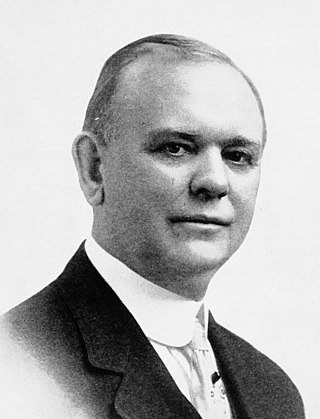
William O. Head was mayor of Louisville, Kentucky, from 1909 to 1913.

John Henry Buschemeyer was mayor of Louisville, Kentucky from 1913 to 1917.

John Henry Whallen was a Democratic Party political boss in Louisville, Kentucky during the late 19th and early 20th centuries. Born in New Orleans, he moved with his family to Cincinnati, Ohio in his youth. As a boy during the Civil War he served the Confederate Army in Schoolfield's Battery as a "powder monkey", a boy who carried gunpowder. He later served as a courier for General John Hunt Morgan.
Huston Quin was mayor of Louisville, Kentucky from 1921 to 1925.
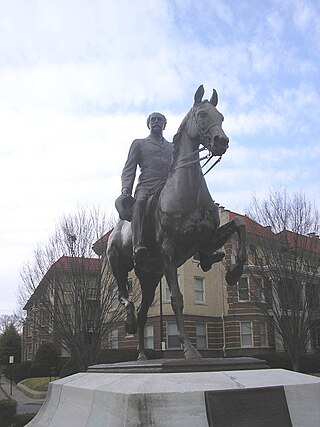
The John B. Castleman Monument, within the Cherokee Triangle of Louisville, Kentucky, was unveiled on November 8, 1913. The model, selected from a competition to which numerous sculptors contributed, was designed by R. Hinton Perry of New York. The statue was erected to honor John Breckinridge Castleman at a cost of $15,000 by popular subscription from city, state, and other commonwealths. The statue is made of bronze, and rests on a granite pedestal. It stands 15-feet high, with a base of 12×20 feet. The monument was placed on the National Register of Historic Places on July 17, 1997, as part of the Civil War Monuments of Kentucky MPS. There have been attempts to remove the statue since January 2019 due to the fact that Castleman was a Major of the Confederate army. The monument was removed on June 8, 2020, and is pending cleaning and relocation to Castleman's burial site.

Gregory Edward Fischer is an American businessman and entrepreneur who served as the second mayor of Louisville Metro from 2011 to 2023. In 2019, he was elected vice president of the U.S. Conference of Mayors, and in 2020, he served as its president.

William Henry Steward was a civil rights activist from Louisville, Kentucky. In February 1876, he was appointed the first black letter carrier in Kentucky. He was the leading layman of the General Association of Negro Baptists in Kentucky and played a key role in the founding of Simmons College of Kentucky by the group in 1879. He continued to play an important role in the college during his life. He was also co-founder of the American Baptist, a journal associated with the group, and Steward went on to be the journal's editor. He was a leader in Louisville civic and public life, and played a role in extending educational opportunities in the city to black children. In 1897, his political associations led to his appointment as judge of registration and election for the Fifteenth Precinct of the Ninth Ward, overseeing voter registration for the election. This was the first appointment of an African American to such a position in Kentucky. He was elected president of the Afro-American Press Association in the 1890s He was a close associate of Booker T. Washington, and in the late 1890s and early 1900s, Steward was a prominent member of the National Afro-American Council, which was dominated by Washington. He was president of the council from 1904 to 1905. He was a lifelong opponent of segregation and was frequently involved in anti-Jim Crow law activities. In 1914 he helped found a Louisville branch of the National Association for the Advancement of Colored People (NAACP), which he left in 1920 to become a key player in the Commission on Interracial Cooperation (CIC). He was also a prominent freemason and twice elected Worshipful Master of the Grand Lodge of Kentucky.
Weissinger is a surname of German origin. Notable people with the name include:
















